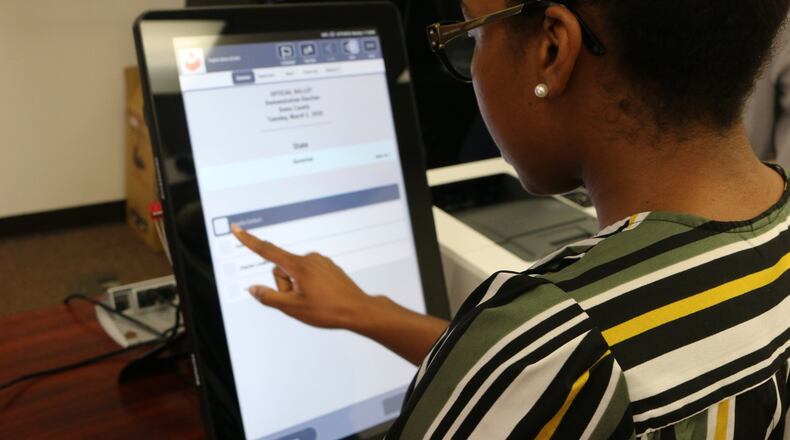A South Georgia judge ruled Wednesday that elections can move forward on Georgia's new voting computers, deciding against plaintiffs who said the large touchscreens failed to keep ballots secret.
The ruling clears the way for voters to cast their ballots on the touchscreen-and-printer voting system when early voting for the presidential primary begins Monday.
Sumter County Superior Court Chief Judge R. Rucker Smith denied an emergency motion to require paper ballots filled out by hand instead of by computer.
Smith's decision is a victory for election officials who argued that voter privacy can be protected by turning touchscreens around so that they face precinct walls instead of voters waiting in line.
“You can protect the right of the secret ballot while using the ballot marking devices,” said Bryan Tyson, an attorney for the Sumter County elections board. “There’s no delay with the system. The judge got it right.”
The plaintiffs in the lawsuit, led by the Coalition for Good Governance, said election officials must find a way to obey the Georgia Constitution’s requirement for a secret ballot.
“Merely turning the screens around doesn’t do the trick,” said Marilyn Marks, executive director for the Coalition for Good Governance, an election integrity organization. “This issue is far from over. The law requires absolute secrecy so no one can know how anyone else votes.”
Marks said voters will still be able to see how their neighbors vote when they walk past rows of touchscreens, and some precincts are too small to position the screens in a way that they can’t be observed.
The lawsuit, filed Monday, came as a late effort to stop Georgia's $104 million voting system before it's used by voters statewide during early voting Monday in advance of the March 24 presidential primary.
Voters will make their choices on touchscreens, which are connected to printers that will create paper ballots. Then voters will be asked to review their ballots for accuracy before inserting them into optical scanning machines for tabulation.
The touchscreens will come with blue screens set up around them, but the lawsuit said that highlighted selections displayed on the screens are still visible from 30 feet away.
Under state law, hand-marked paper ballots are necessary in emergency situations, when using touchscreens becomes “impossible or impracticable.”
Tyson said touchscreens can be protected from public view while still complying with laws requiring poll workers to be able to monitor voting equipment.
The lawsuit was brought in Sumter County, the largest of nine South Georgia counties where early voting for a state Senate runoff began Monday.
Two Republicans are competing to fill the seat previously held by state Sen. Greg Kirk, a Republican from Americus who died in December after battling bile duct cancer. The election will end Tuesday.
While this case only applied to Sumter County, the plaintiffs hoped it could persuade election officials across Georgia to switch to hand-marked paper ballots.
About the Author
Keep Reading
The Latest
Featured





